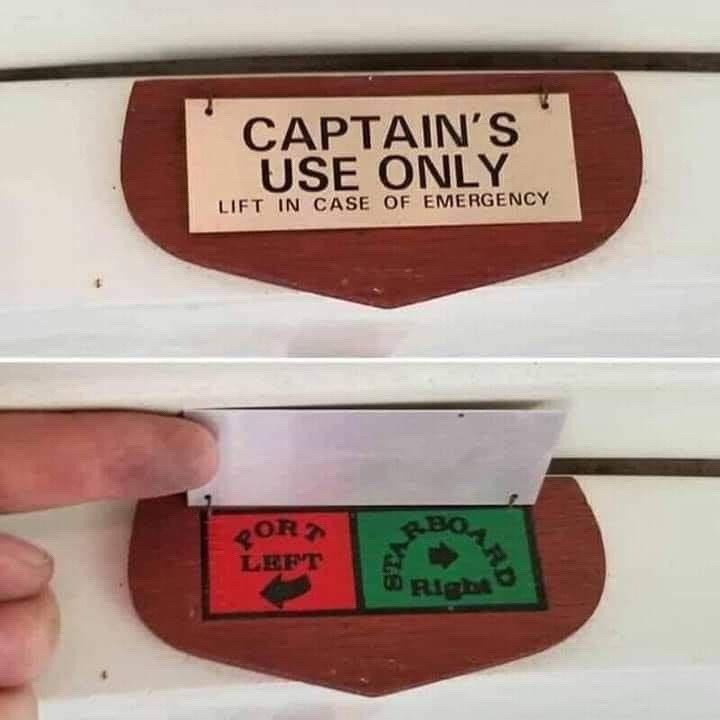770
this post was submitted on 06 Oct 2023
770 points (99.0% liked)
Funny: Home of the Haha
5833 readers
44 users here now
Welcome to /c/funny, a place for all your humorous and amusing content.
Looking for mods! Send an application to Stamets!
Our Rules:
-
Keep it civil. We're all people here. Be respectful to one another.
-
No sexism, racism, homophobia, transphobia or any other flavor of bigotry. I should not need to explain this one.
-
Try not to repost anything posted within the past month. Beyond that, go for it. Not everyone is on every site all the time.
Other Communities:
-
/c/TenForward@lemmy.world - Star Trek chat, memes and shitposts
-
/c/Memes@lemmy.world - General memes
founded 2 years ago
MODERATORS
you are viewing a single comment's thread
view the rest of the comments
view the rest of the comments

Is there a reason they don't just say left and right?
Left and Right rely on the orientation of the person. So if I'm looking ahead at you, and you're looking at me, my left is different than yours. However, port and starboard don't change based on position of the viewer but the position of the vessel. Cuts out any ambiguity.
Like driver's side and passenger side on a car. It doesn't even matter where it was made and it will work out as long as they look for the steering wheel.
*Except the McLaren F1 and probably a few others.
Still doesn't seem necessary. Your orientation doesn't matter if you always take the direction as if you were in the drivers seat (captains chair). It's the same with cars, left side is drivers side, right side is passenger (unless you're in one of those backwards countries, then left would be passenger, right would be driver, but it's still the same side of the vehicle).
Correct. And you would refer to that as something specific because if you just said left people might think that you are talking about your personal left. So you come up with short hand to mean the left when facing the front of the ship, and right when facing the front of the ship. The words that were agreed upon for this purpose? Port and starboard.
On a ship people will not be facing the same direction at all times. This is why the shorthand was invented. As someone who actually spent time on boats and where this was important, trust me. It's necessary.
It's the ship version of stage left and stage right for theatre. Or drivers side and passenger side for cars.
We use these types of phrases all the time to avoid any ambiguity.
you can spice it up in a theatre with "prompt side" and "bastard prompt"
Left is left, right is right. If you're basing it off how you or others are facing, you're a moron. The orientation is based off where it would be if you were in the drivers seat. It's really not hard.
You’re just demonstrating why using left/right is just confusing and why separate terms were invented to remove the ambiguity
Morons exist, you may not have time to clarify my right or your right. When relying on critical timing, you want to cut that out. If you have ever heard someone say "my right or your right" when you've said right, concede the argument. There is a reason and if there was not they wouldn't have been created.
Left and right are referenced to yourself, or relative. Port and starboard are referenced to the ship, or absolute.
It's the same reason people who work in theater say "stage right" and "stage left" instead of just "right" and "left."
Imagine being on a boat for weeks, in the middle of the ocean, with no land in sight; it makes a lot of sense that you would think of locations in terms of the ship, as that is your only reference point.
Nice added touch about the stage directions!
Historically, boats had rudders (or “steer boards”) along the side of the ship instead of in the middle like we’d see them today. It was always on the right side of the boat, so to avoid smashing your rudder into the dock, you’d dock your ship on the other side. That means it was always the left side that literally faced the port, while starboard faced out into open water to protect that side from damage.
TIL about steer boards, thanks!
Same!
The "board" part comes from "side of a ship", as in "the board where the steer is attached".
Same meaning as in "going over-board".
Port used to be larboard. I'm sure that wasn't at all confusing.
whaat.
This makes so much sense.
Then you have to say something like "your left or mine?" This removes any ambiguity, and that might matter when one is at sea.
Your port or mine?
OUR port
Also, port is red and Starboard is green. Usually boats will colour the sheets to match. It helps to identify the lines when someone tells you to ease the port sheet.
Also for beacon lights so others can tell if you are coming towards them or going away.